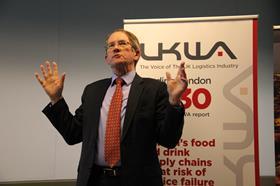
A major new study has called for London’s food and drinks businesses and logistics firms to work together to avoid a food logistics crisis.
The Feeding London 2030 report warns that, with the population of the UK’s cities growing at an unprecedented rate, the logistics industry is beginning to struggle to supply grocery retailers and other food outlets in London as well as other UK city centres.
Although the report, commissioned by the United Kingdom Warehousing Assosiation (UKWA), is only a starting point to addressing the problem rather than a set of concrete policy proposals, it calls on businesses in the food and drinks supply chain to collaborate and communicate to help avoid congestion and consolidate food deliveries.
Consolidation centres, where produce can be stored locally and orders can be grouped together, are one of the strategies explored in the report.
The study’s authors, Andrew and Nick Morgan from research consultants Global 78, estimate that there will be one million more consumers in London by 2030 – a challenge compounded by the fact that road congestion is increasing, food outlet formats are changing, and the number of street food traders is growing.
The thirst for faster delivery times and the addition of new consumer-facing delivery services like Deliveroo and Uber Eats have further complicated the issue – as has the fact that, according to the report’s authors, town planners sometimes give little thought to the logistics of delivering food to the city centre.
If the emerging crisis is not addressed now, it could lead to a shortage of essential food supplies, according to the study.
The report’s lead author Andrew Morgan said: “Things are becoming stretched across London’s food and drink supply chains and current logistics thinking is no longer fit for purpose.
“Supplying food and drink that is both safe and delivered on time to London’s retail and food service outlets at an appropriate cost will become increasingly difficult unless steps are taken to address the issues highlighted in the report.
“For too long the food and drink industry and its logistics partners have been overly reactive in their approach to meeting changing consumer demands. This report provides the opportunity to identify and assess future trends and so give stakeholders the chance to ‘get on the front foot’.”
Andrew and Nick Morgan took a ‘nine-step cluster analysis’ approach in the study, using various London neighbourhoods as case studies to identify the challenges facing businesses in different parts of town.
Holland Park, Coulsdon and Canning Town were examined as examples of high-, mid-, and low-income areas, while Paddington (a transport hub), Canary Wharf (a business hub) and Maritime Greenwich (a tourist hub) were also selected.
Some of the issues examined in detail in Feeding London 2030 include:
- The impact of the increasingly congested urban environment;
- New consumer demand profiles for food and drink;
- Current trends in delivery frequencies, times and volumes;
- Changes in the grocery retail sector that impact on supply chains;
- The significance of the hospitality and food service sector;
- Maintenance of food hygiene and food safety through the supply chain;
- The logistical pressures associated with food waste and other waste streams.
Commenting on the report, UKWA’s chief executive officer Peter Ward said: “Feeding London 2030 examines the issues that the logistics community, grocery retailers, caterers, food and drink manufacturers and distributors, waste management companies, government agencies and industrial property agents must address as they strive to develop solutions to the city logistics challenges that lie ahead. It provides essential intelligence for successful forward planning.”
Feeding London 2030 is a 100-page document that features original charts, graphs and other visual illustrations that support the text. It is priced at £790.00 for non-UKWA member companies and £395.00 for UKWA members.



